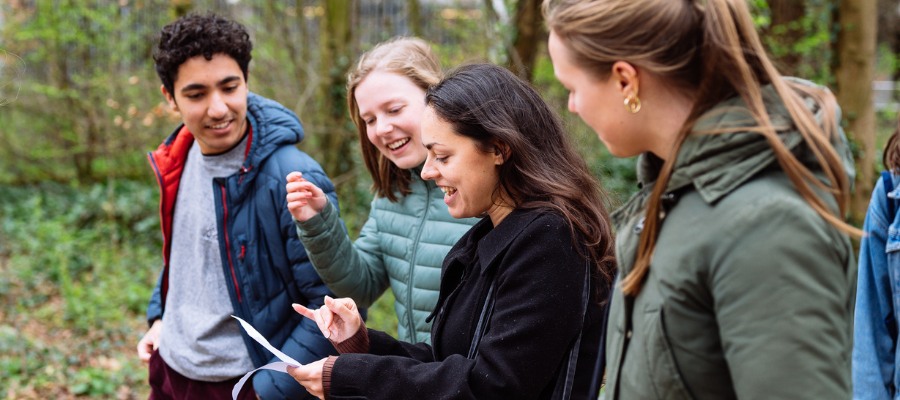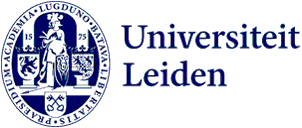
Study information | On Campus Experience
Experience Day Leiden University College The Hague - Green edition
- Date
- Saturday 17 May 2025
- Time
- Explanation
- This Experience Event takes place at the campus of Leiden University College The Hague in The Netherlands.
- Address
-
Anna van Buerenplein
Anna van Buerenplein 301
2595 DG The Hague
Thank you for your interest in joining the LUC Experience Day, Green Edition! By spending the day with us, you’ll learn about the scientific, political, and social aspects of the climate and biodiversity crises – and connect with others about what we can do to contribute to positive change.
In the morning, there will be sample classes with LUC instructors and current LUC students. Lunch will be a vegan lunch catered by our very own Community Kitchen, which sources rescued vegetables that would otherwise go to waste. Alongside lunch there will also be a Green Fair where you can get acquainted with student organizations and local NGOs that focus on sustainability. Finally, in the early afternoon, LUC students will guide you on nature excursions within the beautiful, green city of The Hague.
All in all, it will be a great way to meet other young people who care about sustainability, and to find out what it might mean to study these topics as a university student.
Want to join?
Sign up now >>The programme
Please find the tentative schedule of the experience day below:
| 09:30- 10:00 | Registration |
| 10:00 - 12:45 |
|
| 12:45 - 13:45 | Lunch break |
| 13:45 - 16:00 | Excursions in the city of The Hague and in nature around The Hague |
Please note all times are in CEST / Amsterdam time zone.
Can parents join this experience day?
We understand that parents and caregivers play a key role in the University Exploration process. However, during this day the sample class and excursions will mimic a real university setting as much as possible. Therefore you will join without your parents.
Sample classes & Excursions
Below you can find the descriptions of the different classes and excursions. We will soon update our registration form so you can pick the sessions of your choice.
Sample classes | Round 1
Over half the world lives in cities, and urban areas grow by thousands of square kilometers every year. What does this mean for wildlife? Although it is clear that urbanization causes habitat loss and species extinctions, its impacts on biodiversity are far from straightforward. Cities are packed with non-human life, and nature quickly reclaims open spaces. In this workshop we will venture outdoors into the Haagse Bos, the green heart of The Hague, to learn about urban biological corridors. These give nature space and restore connectivity, also
for species that struggle in urban environments, such as owls and bats. We will learn how urban corridors are designed and what their intended and unintended effects may be on wildlife and humans in the city.
What is geoengineering, and can it help us mitigate the impacts of climate change? In this class we will learn all about the science—and politics—of large-scale interventions in the Earth’s oceans, soils and atmosphere. Some forms of geoengineering, such as solar radiation management, raise ethical concerns about the potential unintended consequences and the distribution of benefits and risks. Other forms hold important implications for international cooperation, equity, and the distribution of power and responsibility in the governance of the global environment. Come learn how a political perspective can help us understand the promises and perils of these much-discussed technologies.
LUC’s Climate Game presents thought-provoking dilemmas about climate change and climate-saving measures. Each dilemma proposes a measure to reduce CO2-emissions. In this game, you engage in a discussion to determine which measures are most effective in combating climate change.
Students are divided into small groups to ensure engaging discussions. As a player, you receive a set of cards (resources) that you can use during the game. You are then presented with different scenarios, in which you take on the role of a stakeholder. From this perspective, you must decide whether to support the proposed measure in the scenario or not. You discuss your reasoning and then use your resources accordingly. Each player decides individually how much they support the measure, but the total contribution of all players is combined, making collaboration essential. This playful game makes you think about climate change and climate change mitigation, and will let you test out your debating and negotiation skills.
Sample classes | Round 2
What are the essential elements that make up your vision of sustainable living, and how are these provided by your immediate environment? For example, is your local park a key space? Perhaps a bicycle path? Or maybe the local community center? In this workshop you will explore the visions and spaces of The Hague that matter to LUC students enrolled in the course, Searching for Sustainable Livelihoods. Through game play we will learn why students value these spaces, in what ways they may be under threat, and how we can help protect them. You will also learn about the power of art and artistic methods to not only provide insights about our environments and our relationships with them, but also to advocate for better, healthier, stronger connections.
In March 2019, Fridays for Future organized a global “school strike” that gathered more than one million participants across 125 countries. Since then, it has been impossible think about climate activism without considering the role of young people. But what is the longer history of youth leadership in environmental politics, and what special role do young people play in these movements today? In this session, Dr. Ann Marie Wilson will give a brief historical introduction and then we’ll hear from a panel of LUC students who will speak about their experiences working for climate justice in the present day. There will be ample room for questions and discussion, and you’ll be able to share your own experiences if you wish.
Waste is something that all of us deal with every day – but so much about it happens out of sight and out of mind. In this interactive workshop, we will track our waste on its journey from disposal to recycling, landfills, or composting. We will explore how waste is created, where it goes, and how it impacts the environment. And we’ll learn about key concepts in waste studies, which will help us understand how our choices affect sustainability and the planet.
Afternoon
After spending some time in the LUC college building, it will be time to go outdoors! Students from The Ecology Project course will lead you on an immersive nature excursion to one of three beautiful green spaces in The Hague: Haagse Bos, Clingendael Park, and Westduin Park. You will learn about the surprising biodiversity to be found in a bustling city, and you’ll get a chance to (re-)connect with nature using multiple senses: touch, smell, sight, and hearing. Above all, it will be a fun way to slow down and experience how time outdoors can both foster community and ground you as you balance the work and other activities that fill your time as a busy student.
Please note: For the field trips to Clingendael and Westduin Park it is necessary to have a bike. If you live in The Hague, we recommend bringing your own. If you do not live in The Hague, we recommend renting an OV-bike. Please note that this requires a registration with NS. The registration itself is free, the bike rental is less than €5. You can read more about that here. For the excursion to Haagse Bos, it is not necessary to have access to a bike.







